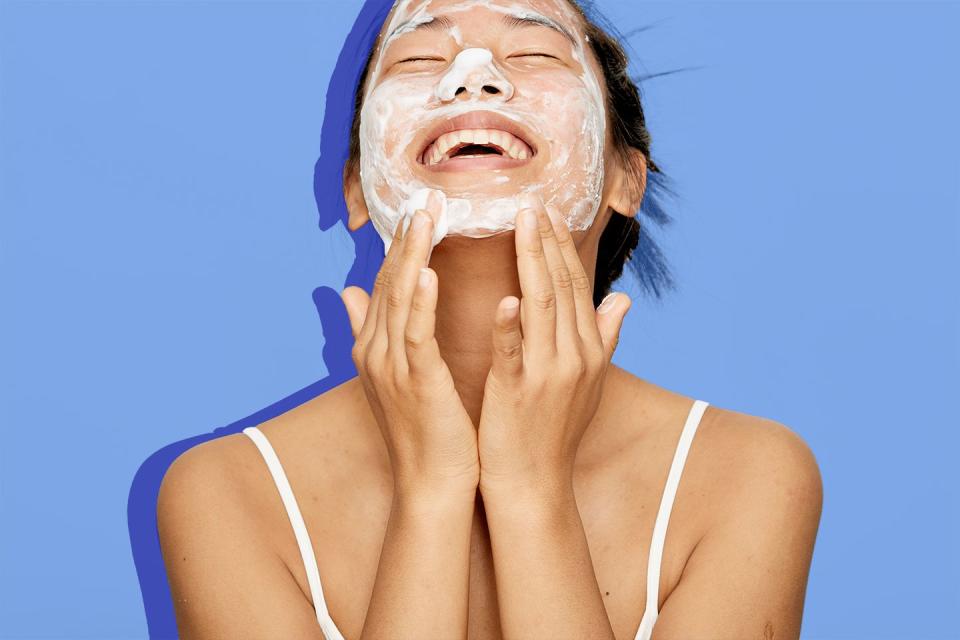See the Dermatologist-Approved Acne Scar Treatments That Put Bad Skin in the Past

Dark marks and scars can affect your complexion long after acne fades. Severe acne scars can be difficult to treat with over-the-counter options, but more common hyperpigmentation and red scars can be treated (and prevented) with readily available creams, peels, and spot-treatments — if you know what you're looking for.

We chatted with Dr. Joyce Imahiyerobo-Ip, a board-certified dermatologist practicing in Wellesley, Mass., about her picks for the best acne scar treatment available today. For hyperpigmentation, she recommends products containing ingredients like resveratrol and vitamin C, like the HydroPeptide LumaPro-C Skin Brightening Pigment Corrector. If deep, sunken-in scars are the issue, she recommends a microneedling tool like the Ora Microneedle Face Roller to stimulate collagen.
Imahiyerobo-Ip shared her other favorite products for treating acne scars with us, but before you skip to that, she shared everything you should know so you can get a handle on what you're working with. See our FAQ with her below, and get ready to put acne scars in the past.
What are the best ingredients to look for in an acne scar treatment?
"In order to determine what ingredients will help treat your acne scars, you must first identify what type of scar you have. The majority of scars will appear flat. They can be red or dark brown, depending on your skin type, and on where they are in the healing phase. When scars are excessively red, dermatologists describe them as hyper-vascular (meaning a lot of blood vessels). When a scar is excessively dark, we describe this as hyper-pigmented. Some scars will appear as sunken or pitted (acne scars often have this appearance).
For hyper-pigmented scars, there are a number of over-the-counter ingredients that can help. The gold standard for treating hyperpigmentation is a medication called hydroquinone. This is a skin-lightening medication that can be found over the counter at a 2% concentration.

When it comes to skin brighteners, look for ingredients like kojic acid, glycolic acid, azelaic acid, niacinamide, licorice root, and vitamin C. Red acne scars are a bit more challenging to treat with over-the-counter products. These types of scars usually fade on their own with time. However, it's extremely important to wear a good broad spectrum sunscreen, because the sun makes red scars more pronounced."
How often should you treat acne scars? Is there a specific routine you recommend to your patients?
"The most important thing to do when treating acne scars is to treat the acne. If you still have acne, then you're fighting a losing battle. In general, I recommend a gentle cleanser in the morning followed by a skin lightening/brightening agent followed by sunscreen.

In the evening, you can continue with the skin brightener, or you may want to add a retinol product to help increase skin turnover and improve skin healing. These home treatments are best paired with in-office treatments that can treat acne scars, such as chemical peels, Vbeam vascular laser, and microneedling."
Any tips for newbies when it comes to working with tools like at-home micro-needling devices?
"Micro-needling works great for pitted acne scars. However, I would exercise caution with home devices. If you have darker skin, aggressive micro-needling may cause hyperpigmentation. Treatments should not be performed too frequently, no more than every 4 to 6 weeks. When you microneedle, you're creating tons of tiny holes in the skin. You must be careful and respect what you put on the skin afterwards. Gentle products only."
Are there any treatments that you recommend combining with the use of an at-home scar cream to further improve the appearance of acne scars?
"Certainly, your dermatologist can outline a plan for you based on the types of scars you have. Some tools we use in the office include chemical peels, IPL, Vbeam laser, microneedling, fillers to plump depressed acne scars, and a technique called sub-cision where the doctor mechanically breaks up scarred down tissue."
Check out these derm-approved acne scar treatments below, and get ready to say sayonara to scars forever."
Learn More About Our Expert Dermatologist's Picks:
Best for Correcting Hyper-Pigmentation
Hyperpigmentation is one of the most common types of acne scarring — especially for those with darker skin. The brown spots, which are caused by an excess of melanin, usually disappear with time. However, more stubborn spots can respond to topical treatments, particularly when used in combination with sunscreen.
Imahiyerobo-Ip suggests using this skin brighter in conjunction with a high SPF sunscreen that won't clog pores (see below for her favorite pick). This LumaPro-C correcting serum features a blend of ingredients like vitamin C and resveratrol, which can lighten dark spots. It's also formulated with peptides, which can reduce damage caused by acne and UV rays by increasing collagen production.
Best for Raised Acne Scars
Keloids, or hypertrophic scars, are raised above the skin, and they can be difficult to treat. Imahiyerobo-Ip explains that these types of scars "occur when the body makes too much collagen during the wound healing process," an issue that can be mitigated with the use of silicone dressings.
The silicone, she says, "puts pressure on the scar as it is healing, making it hard for excessive collagen to form." These dressings can be purchased in the form of small sheets or as a liquid application, and they should be placed on acne scars every night for several months for optimal results.
Best for Prevention
While the very best way to prevent acne scarring is to treat the underlying acne itself, another way to keep things from getting worse is to use a high-SPF sunscreen that won't clog your pores. Sunscreen can actually prevent hyperpigmentation from getting worse.
"When I am dealing with hyperpigmented acne scars, I always wear SPF 50, rain or shine," Imahiyerobo-Ip says. This particular formula by Avene is her favorite because it's noncomedogenic and ultra light.
Best Concealer for Red Scars
"Red acne scars occur because of excess blood-vessel proliferation when the skin is healing after an injury," Imahiyerobo-Ip tells us. Sunscreen is vital to preventing these scars from worsening, because excessive exposure to the sun can actually lengthen the vascular healing phase of a scar. However, a quick solution to balancing out red marks and scars is using a concealer that's tinted green.
This medicated concealer by Clinique is also excellent for general acne, as the moderate blend of salicylic acid and benzoyl peroxide can calm aggravated areas without drying out the skin.
Best for Sunken Acne Scars
Sunken scars (also known as "ice-picked" scars) can be difficult to treat. If you're dealing with severe divots, you can opt for injectable fillers administered by a trained professional, or check out other forms of treatments, like laser resurfacing or microdermabrasion. For an OTC approach, a microneedle face roller can be helpful in stimulating the production of collagen and evening out your skin when used a few times a week.
Make sure to get one that's been properly sterilized and packaged, and only go for reputable brands like ORA. Because these facial rollers have micro-sized needles that gently pierce the skin (don't worry, it's not painful!), it's important to follow instructions about how to properly clean and sanitize them between uses.
More of Dr. Imahiyerobo-Ip's Picks:
Great Cream for Correcting Hyperpigmentation
Brightening cream is a more long-term solution to hyperpigmentation, and it should always be combined with high-SPF sunscreen. This acne scar treatment from Envy Medical is another favorite of Imahiyerobo-Ip, and it provides a more affordable alternative to the LumaPro-C formula from HydroPeptide.
Best Peel for Correcting Hyperpigmentation
Peels are another great choice for hyperpigmentation, providing a super concentrated formula that exfoliates the skin and enhances cell turnover. The alpha hydroxy acids in the 5x Power Peel help to get rid of impurities in the skin, which can prevent acne in the first place, and there are also mushroom enzymes, which aid in the skin's rejuvenation process. This can help to get rid of your dark spots over time, particularly when combined with SPF 50 or higher.
Pin It for Later!

Read More:
The Best Hydrating Eye Creams for a Rejuvenating Routine
15 Amazing Sheet Masks for Your Next At-Home Spa Night
Follow BestProducts.com on Facebook, Instagram, Twitter, and Pinterest!
You Might Also Like

